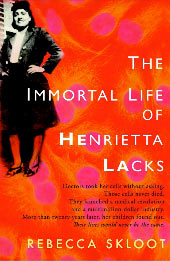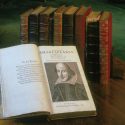‘The Immortal Life of Henrietta Lacks’ chosen for Go Big Read program
UW-Madison Chancellor Biddy Martin has selected “The Immortal Life of Henrietta Lacks” by Rebecca Skloot as the book for the second year of Go Big Read, the university’s common reading program.

The book was chosen from a short list compiled by a review committee from nearly 160 unique titles nominated.
The purpose of the program is to engage students, faculty, staff, alumni and community members in a shared, academically focused reading experience. “In Defense of Food,” by Michael Pollan, was selected last year.
“The inaugural Go Big Read was everything I hoped it would be, engaging people from across campus and the community in discussions of important issues and ideas,” says Martin. “In addition to being a great read, ‘The Immortal Life of Henrietta Lacks’ is cross-disciplinary and relevant, and will engage students and readers on a number of intellectual and personal levels.”
Ken Frazier, director of UW–Madison Libraries and a member of the Go Big Read Steering Committee, also praised the choice.
“Our reviewers were drawn to this book because it is compelling and readable as a story and intensely interesting in the way it handles complex ethical and scientific issues,” Frazier says. “I can’t imagine any book that would be a better gateway to the intellectual richness of UW–Madison.”
Henrietta Lacks was a poor black woman in Baltimore who died in 1951 at age 30 from cervical cancer. Before her death, a sample of her cancerous tissue was taken without her knowledge or consent, standard procedure at the time. Skloot tells the story of what happened to her cells and the influence they had on medicine.
Those cells could reproduce indefinitely without disintegration — a medical and scientific breakthrough. This development made research and key medical advances possible, including vaccines for polio and the human papillomavirus, treatments for leukemia and other drug developments, and uncovering information about cancer. Named HeLa, for HEnreitta LAcks, the cells have been made, bought and sold by the billions and created a profitable industry that manufactures and sells human biological materials.
Meanwhile, Lacks’ family lived in poverty; Lacks was buried in an unmarked grave. Lacks’ family did not know about Henrietta’s “immortality” and the proliferation of and profit from her cells until 20 years after her death, when researchers began studying her husband and children, again without their informed consent. Skloot spent 10 years researching and writing the book, eventually getting Lacks’ family to talk to her.
In addition to compelling personal stories and stories about extraordinary scientific progress, the book raises issues of medical ethics, poverty, racism, ownership rights and the law. These topics have great potential for classroom use. The book crosses many disciplines and should be of particular interest on a campus that is a pioneer in stem cell research.
Planning on how the book will be used in classrooms and possible special events associated with “The Immortal Life of Henrietta Lacks” are under way. Skloot is slated to visit campus in the fall semester, when she will give a talk and sign books. Copies of “The Immortal Life of Henrietta Lacks” will be given to first-year students at the Chancellor’s Convocation for New Students and to students using the book in their curricula.
To learn more about the ongoing Go Big Read program, plans for fall 2010, and to sign up for e-mail updates, visit the Go Big Read Web site, http://www.gobigread.wisc.edu.


